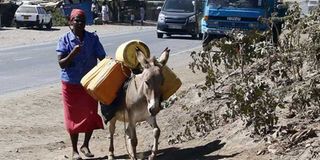Nakuru residents assured of steady water supply as rationing to affect only 15pc

A woman transports water on a donkey at Maili Sita on the Nakuru-Nyahururu road on January 16, 2017 as the drought persists. The Nakuru water company has assured its customers that only 15 per cent of residents will be affected by water rationing. PHOTO | SULEIMAN MBATIAH | NATION MEDIA GROUP
What you need to know:
- Areas to be affected include Mwariki East, Mzee Wanyama, parts of Free Area, parts of Naka, Prairies, Lanet and Shiners.
- Most of the water supply in Nakuru is usually from boreholes which have not been affected a lot by drought.
- Naruwasco has called on their customers to use the water for domestic needs only.
- It has emerged that some people are using the water for irrigation.
The Nakuru Water and Sanitation Services Company has assured its customers that only 15 per cent of the residents will be affected by water rationing during the ongoing dry season.
Major water sources, including rivers and dams, are quickly drying up due to the prolonged dry spell, with rains expected three months from now.
The company’s Managing Director James Gachathi said the 15 per cent are those who get their water from rivers as there is very little water available currently.
“For the 15 per cent of the residents supplied from river sources. which include River Malewa and Mereroni, there is very little water available and thus [there will be] lots of rationing,” said Mr Gachathi.
AFFECTED AREAS
The areas expected to be affected by the rationing include Mwariki East (near Stem Hotel), Mzee Wanyama, parts of Free Area (Murogi), parts of Naka (around Excel Academy), Prairies, Lanet and Shiners.
He said water supply in the areas depends mainly on the two rivers, whose levels have significantly dropped as the drought continues in most parts of the country.
However, he pointed out that most of the water supply in Nakuru is usually from boreholes, which he said had not been seriously affected by the dry spell.
"For Nakuru municipality, 85 per cent of the water supplied is from boreholes, which are located in very rich aquifers. So we do not expect much change in the programme of supply," he said.
The assurance comes even after the Nakuru Rural Water and Sanitation Company Ltd (Naruwasco) called on its customers to use the water for domestic needs only so as to prevent shortages during the dry season as it emerged that most of them are using the water for irrigation.
Naruwasco Managing Director Reuben Korir warned that the company will disconnect customers who have not been paying for the water.





